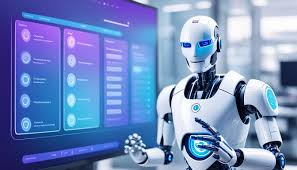Introduction to AI-Based Scheduling
AI-based scheduling represents a significant advancement in the domain of time management, leveraging innovative technologies to optimize the allocation of resources and time. Unlike traditional scheduling methods, which often rely on manual input and static algorithms, AI-infused systems utilize machine learning and predictive analytics to enhance their efficiency and accuracy. This transformative approach marks a shift from reactive scheduling—where decisions are made passively based on circumstances—to proactive scheduling that anticipates client needs and organizational requirements.
The evolution of scheduling technology has been rapid over recent years. Initially, scheduling tools focused on basic task management, with limited functionalities. As businesses grew and their operational complexities increased, the need for more sophisticated tools became evident. Enter artificial intelligence, a game changer that introduced the capacity for real-time adjustments, continuous learning, and integration with various productivity tools. AI-based systems analyze past data, understand user behavior, and can allocate time slots in optimal ways that traditional methods struggle to achieve.
The role of artificial intelligence in this context cannot be understated. By examining patterns and predicting future behaviors, these systems can reduce conflicts and enhance collaboration among team members. Furthermore, AI-based scheduling empowers individuals by minimizing the stress associated with planning and prioritizing tasks. It offers intelligent recommendations and automates routine processes, allowing organizations to focus on strategic growth rather than getting bogged down by administrative tasks.
In essence, AI-based scheduling is not just about efficient time management; it represents a fundamental shift toward smarter, data-driven approaches that enhance productivity in both personal and professional realms. The integration of AI into scheduling practices ensures that individuals and organizations can navigate increasingly complex schedules with ease and confidence.
Key Features of AI Scheduling Tools
AI scheduling tools have become increasingly essential for professionals seeking to improve their time management and productivity. These tools leverage advanced algorithms and machine learning capabilities to streamline the scheduling process, making them unique and effective in numerous ways. One of the standout features is automatic conflict resolution. When scheduling meetings or appointments, these tools can instantly identify overlapping commitments and suggest alternative time slots, ensuring that all parties involved can find mutually convenient times. This feature removes the tedious back-and-forth communication often associated with traditional scheduling.
Another key feature is smart availability detection. AI scheduling tools can analyze the calendars of participants, recognizing when they are free or busy. This information enables the software to propose suitable time frames, which significantly reduces the time taken to finalize meetings. Additionally, the integration capabilities with various calendar platforms such as Google Calendar, Microsoft Outlook, and Apple Calendar allow users to synchronize their schedules seamlessly. This integration ensures that users have a holistic view of their commitments, regardless of where they have been recorded.
Furthermore, natural language processing (NLP) capabilities represent a significant advancement in user interaction. Users can input requests using conversational language, and the software interprets these inputs to schedule appointments effortlessly. For instance, simply stating, “Schedule a meeting with Sarah on Tuesday at 3 PM” allows the AI tool to understand the request and act upon it without requiring complex commands or navigation through menus. This intuitive interaction makes scheduling more accessible and user-friendly, even for individuals who may not be tech-savvy.
These features collectively signify the innovations in AI-based scheduling tools that revolutionize traditional time management practices. As organizations continue to adapt to remote and hybrid work environments, the demand for effective scheduling solutions is likely to grow, highlighting the importance of these intelligent platforms in enhancing efficiency.
Benefits of Using AI-Scheduling Solutions
Incorporating AI-scheduling solutions into daily workflows offers a multitude of benefits, significantly enhancing both personal and professional time management. One of the primary advantages is time savings. AI algorithms can analyze scheduling patterns and preferences, allowing users to automate tasks such as setting appointments and reminders. This automation reduces the time spent on tedious scheduling activities, enabling individuals to focus on more critical functions.
Another notable benefit of AI scheduling is reduced stress. Traditional scheduling methods often lead to conflicts and overlaps, generating frustration and anxiety. AI-powered tools can proactively identify potential scheduling issues and suggest optimal solutions, consequently minimizing stress levels associated with managing appointments and commitments. By efficiently handling these logistics, users can cultivate a more balanced and harmonious daily routine.
Improved productivity is another significant advantage of AI-based scheduling. By analyzing data, these systems can prioritize tasks and allocate time effectively, ensuring that users engage in high-value activities first. This prioritization fosters a more productive environment where individuals can achieve their goals more efficiently. Furthermore, facilitated resource allocation allows teams and organizations to manage their personnel and resources effectively, resulting in enhanced operational efficiency.
Personalization is a key component of AI scheduling solutions as well. Users benefit from tailored experiences based on their behavior and preferences. For example, an AI scheduling tool can learn an individual’s optimal working hours and preferred meeting times, adapting its recommendations accordingly. This personalized approach promotes user satisfaction, enhancing the overall effectiveness of scheduling and making time management more intuitive.
As individuals and organizations increasingly recognize the benefits of AI-scheduling solutions, it becomes evident that these innovations can transform how we manage our time and priorities, leading to enhanced well-being and productivity.
Real-World Applications of AI Scheduling
The integration of AI-based scheduling into various industries has demonstrated its potential to enhance efficiency, satisfaction, and productivity. One notable application can be found in the healthcare sector. Traditional appointment scheduling often leads to long wait times and patient dissatisfaction. However, AI scheduling solutions have streamlined the process by predicting patient loads and optimizing appointment slots based on historical data. Health facilities utilizing AI systems can effectively manage their resources, reduce no-show rates, and improve patient flow, ultimately leading to higher levels of client satisfaction.
In the realm of corporate meeting planning, AI-driven scheduling tools have revolutionized how organizations manage time. These systems can analyze calendars, taking into account the availability of all participants, and suggest optimal meeting times. By automating this process, organizations minimize the back-and-forth communication typically required to set appointments. Particularly in larger companies with employees across multiple time zones, AI scheduling becomes invaluable, allowing for improved collaboration and productivity among teams without overwhelming them with scheduling conflicts.
Logistics and supply chain management are yet another area where AI scheduling proves invaluable. Companies face complex challenges regarding the coordination of shipments, resource allocation, and task management. AI scheduling can forecast demand, optimize delivery routes, and allocate resources most efficiently, thereby minimizing delays and maximizing operational capabilities. This leads to overall enhanced service levels, as businesses can meet customer needs more effectively through timely deliveries and efficient operations. With the ability to react swiftly to changes and challenges, AI-based scheduling systems are now essential tools across numerous sectors, driving efficiencies that were previously unattainable.
Challenges and Limitations of AI Scheduling
As artificial intelligence (AI) continues to innovate time management, particularly through advanced scheduling systems, several challenges and limitations emerge that warrant careful consideration. One of the primary concerns is the reliance on data accuracy. AI scheduling algorithms require extensive data input to function effectively, which means that any inaccuracies in the data can lead to suboptimal scheduling outcomes. For instance, conflicts might arise when the algorithm relies on outdated or incorrect information about participants’ availability, thereby undermining the system’s efficiency.
Another challenge associated with AI scheduling is the potential for technical glitches. Like any technology, AI systems are not immune to malfunctions. Bugs or errors in the software can lead to incorrect scheduling, miscommunication, or missed appointments. Consequently, organizations must invest in regular maintenance and updates to ensure their AI scheduling systems operate smoothly. This reliance on technology may lead to frustration among users, particularly if they encounter frequent disruptions.
User adaptation to new technology also poses a notable challenge. Individuals accustomed to traditional scheduling methods may be hesitant to transition to AI-driven systems. Effective training and user-friendly interfaces are essential to facilitate this change. Moreover, if users do not trust the technology or find it difficult to navigate, they may revert to manual scheduling practices, negating the benefits of AI intervention entirely.
Lastly, privacy concerns regarding personal data employed in AI scheduling cannot be overlooked. The systems often require sensitive information about individuals’ schedules and preferences. Ensuring the security and confidentiality of this data is vital, as breaches can lead to misuse and damage to personal and organizational trust. Addressing these challenges is crucial for realizing the full potential of AI-based scheduling in time management systems.
Future Trends in AI Scheduling Technology
The landscape of AI-based scheduling technology is rapidly evolving, driven by advancements in machine learning and the integration of various digital ecosystems. As organizations seek greater efficiency in their workflows, the future trends within this field are likely to be transformative.
One of the primary trends anticipated is the enhanced use of machine learning algorithms. Current AI scheduling solutions primarily rely on historical data to predict future scheduling needs. However, future innovations will likely enable AI systems to understand contextual cues and user preferences at a much deeper level. This predictive capability will not only enhance efficiency but also personalize the scheduling experience, allowing users to benefit from tailored recommendations that align with their unique working styles and preferences.
Another trend is the integration of Internet of Things (IoT) technologies with AI scheduling tools. The proliferation of smart devices within the workplace will allow scheduling solutions to access real-time data, such as room occupancy levels and resource availability. This integration will facilitate more dynamic scheduling practices that can adapt on-the-fly to changing conditions, ultimately resulting in optimized resource allocation and enhanced productivity.
As automation continues to surge, we can also expect AI-based scheduling tools to take on more complex tasks with minimal human intervention. This increased automation will not only save time but will also reduce the margin for error associated with manual scheduling processes. Furthermore, the ability for these systems to learn from past scheduling outcomes will refine their algorithms over time, leading to smarter and more efficient scheduling practices.
In essence, the future of AI-based scheduling looks promising with the potential for unprecedented levels of automation, personalization, and integration into everyday workflows. These emerging trends will profoundly impact how individuals and organizations manage their time and resources, setting a new standard for efficiency and effectiveness in scheduling.
User Experience: How to Choose the Right AI Scheduler
In the evolving landscape of time management, selecting the appropriate AI scheduler can significantly enhance productivity and streamline workflows. As various tools emerge, it is essential to focus on several key criteria that ensure the chosen solution aligns with individual or organizational needs.
First, assess the features offered by the AI scheduling tool. Some tools may emphasize specific functionalities, such as automated meeting scheduling, reminders, and time zone coordination, while others may provide broader project management capabilities. Identify which features are most relevant to your tasks, as this will help refine your options.
Next, consider the ease of use. A user-friendly interface is crucial, particularly for those who may not be technologically adept. Look for tools that emphasize intuitive navigation, comprehensive tutorials, and support documentation. The less time spent on learning to use the tool, the more time can be devoted to productive tasks.
Integration capabilities represent another significant factor. The ideal AI scheduler should seamlessly connect with existing tools and platforms that you currently utilize, such as email, calendar applications, and project management software. This connectivity enhances workflow efficiency by minimizing disruptions and ensuring consistent data synchronization.
Customer support is an often-overlooked aspect. When choosing an AI scheduler, evaluate the quality and availability of customer service. Having access to reliable support can alleviate stress and quickly resolve any issues, thus maintaining productivity levels.
Finally, pricing is a critical component. Analyze the cost structures of various tools, keeping in mind the features offered and potential return on investment. Many providers offer free trials or demos, making it prudent to test multiple options before committing to a subscription. By taking these factors into account, users can make informed decisions in selecting the most suitable AI scheduling tool to complement their unique time management demands.
Case Studies: Success Stories of AI Scheduling Implementation
The application of AI-based scheduling tools has already transformed various organizations, offering key insights and practical examples of how these systems can drive efficiency and productivity in time management. One noteworthy case is that of a large multinational corporation in the automotive sector. Faced with the challenge of coordinating complex supply chain dynamics and manufacturing schedules, the company implemented an AI-driven scheduling software. This solution integrated real-time data to optimize production timelines, ultimately resulting in a 20% reduction in downtime and a 15% increase in production capacity.
Another illustrative example comes from the healthcare industry. A prominent hospital introduced AI-based scheduling to address the issues of patient care delays and overbooked appointments. By leveraging machine learning algorithms, the hospital’s scheduling system was able to predict appointment durations more accurately and allocate resources accordingly. This not only improved patient satisfaction, evidenced by a 30% drop in wait times but also enhanced staff productivity, as doctors reported higher efficiency in managing their schedules.
Additionally, a tech startup specializing in remote project management tools adopted AI scheduling to streamline team collaboration. Previously grappling with coordination issues due to different time zones and varying work habits, the company utilized an AI scheduling assistant to facilitate meeting planning. This innovative solution resulted in a significant improvement in team alignment and morale, with a reported 40% increase in project delivery speeds.
These examples highlight the multifaceted benefits of implementing AI-based scheduling tools across diverse organizations. By affording greater control over time management and optimizing operations, businesses are experiencing profound advancements in efficiency. As more companies embrace these innovative technologies, the potential for significant organizational transformations remains vast, paving the way for future successes in time management practices.
Conclusion and Call to Action
In today’s fast-paced world, effective time management is crucial for both individuals and organizations. Throughout this blog post, we have explored the significant innovations brought about by AI-based scheduling technology. These advancements have demonstrated a remarkable ability to streamline the scheduling process, enhance productivity, and alleviate the burdens of traditional time management methods. By harnessing the power of artificial intelligence, users can automate the complexities of appointment setting, task prioritization, and calendar management.
AI-based scheduling solutions not only offer efficiency but also provide personalized experiences, adapting to individual user preferences and habits. This creates a more harmonious balance between personal and professional commitments, reducing the friction often associated with schedule conflicts. Moreover, by utilizing predictive algorithms, these tools can forecast optimal meeting times and suggest alternative options, thereby minimizing disruptions and maximizing effectiveness.
As we reflected on the various features available within AI scheduling platforms—ranging from smart calendar integrations to real-time availability checks—it’s evident that adopting such technology could significantly reduce the stress linked to time management challenges. For organizations, investing in AI-driven scheduling solutions can lead to better resource allocation, improved team collaboration, and, ultimately, increased productivity levels.
We encourage readers to consider how AI-based scheduling could revolutionize their approach to time management. Whether you are an individual seeking to optimize your daily routine or a business aiming to streamline operations, exploring AI scheduling options presents an opportunity for enhancement. Take the next step in elevating your scheduling efficiency by researching and implementing AI-powered tools tailored to your specific needs. The future of time management is here, and it is time to embrace the transformation.
How useful was this post?
Click on a star to rate it!
Average rating 0 / 5. Vote count: 0
No votes so far! Be the first to rate this post.









